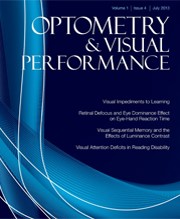Objective: The importance of sports-related concussion identification has received increasing attention in both media and research due to the possible long-term neurological sequelae that may occur with repeated closed head injuries. The King-Devick (K-D) test is a screening test of rapid number naming that requires eye movements, language, attention and concentration to complete. The K-D test has been validated as a measure to determine concussion by identifying suboptimal brain function in athletes ranging from youth to professional levels. The purpose of this investigation is to determine the potential effects of age on K-D scores, applicability of the test in a youth population, and determine the test-retest reliability of the test in elite youth athletes.
Method: Fifty-four athletes (mean age 11.7, range 6-17 years) participating in the 2014 Amateur Athletic Union (AAU) Junior Olympic Games were baseline tested with the K-D test at the beginning of a sports vision screening and then again at the conclusion of the screening with approximately 30 minutes between the baseline test administrations. Baseline test administrations determined Baseline Scores as the fastest error-free time of two consecutive trials.
Results: A high level of test-retest reliability was observed between two baseline trials (ICC 0.89 [95% CI 0.85-0.95]). Similarly, there was a high test-retest reliability between the first baseline score (the best of two trials) and the retest baseline score (ICC 0.93 [95% CI 0.89-0.96]). K-D test time correlated with age as improved K-D scores (lower time) were associated with older athletes with an average decrease (improvement) of K-D score of 3.7 seconds for every 1-year increase in age (95% CI 2.5-5.0, p< 0.001, R2 = 0.50, linear regression).
Conclusions: Results from this study validate that the K-D test has high test-retest reliability for young athletes, who are vulnerable to concussive injury. This study demonstrated an improvement in time with increased age, suggesting that baseline testing should be repeated at least annually. This test is a simple performance measure to help coaches, parents and medical personnel identify concussion on the sidelines, and a change in score from baseline should be an indication for removal from play.
Summary Points:
- There is high test-retest reliability for the K-D Test in youth athletes.
- Faster K-D Test time correlated with increasing age in youth athletes (improvement in score by 3.7s for every 1 year older).
- Baseline testing should be repeated at least annually.
- This test is a simple performance measure to help coaches, parents and medical personnel identify concussion on the sidelines, and a change in score from baseline should be an indication for removal from play.

